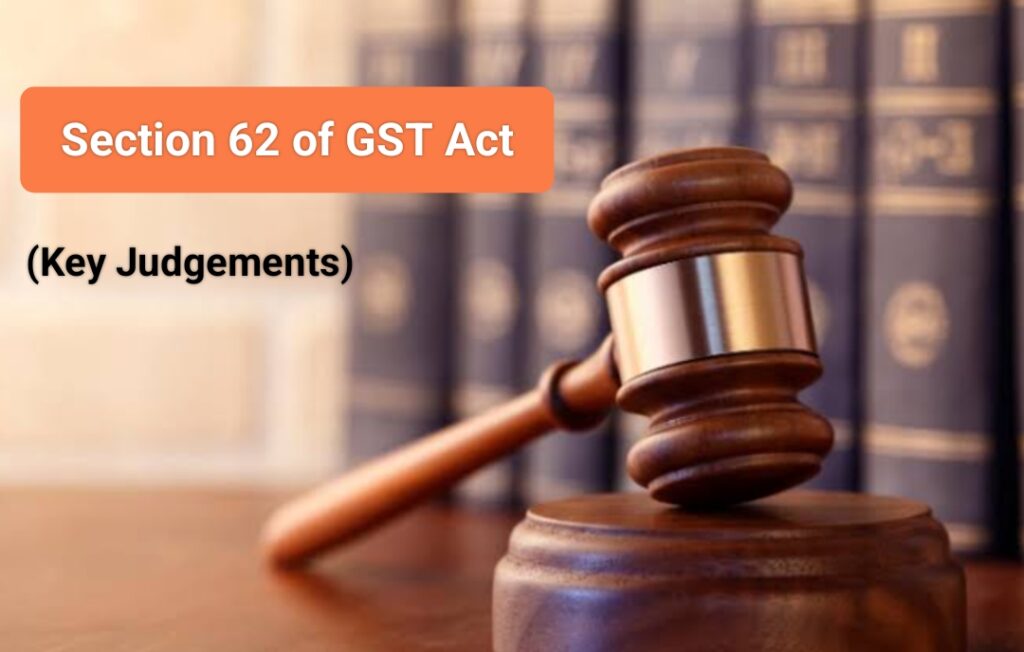Cases related to best judgment assessments under Section 62, emphasizing procedural fairness and legislative amendments.
Section 62 of the Central Goods and Services Tax (CGST) Act, 2017, governs the assessment of taxpayers who fail to file their GST returns. When a registered taxpayer does not file returns despite receiving notices, the GST officer has the authority to determine their tax liability based on available records, issuing a best judgment assessment order. However, this assessment order is automatically withdrawn if the taxpayer submits the pending returns within 30 days of issuance.
Key Judicial Pronouncements on Section 62 of the CGST Act
Several courts have ruled on cases related to best judgment assessments under Section 62, emphasizing procedural fairness and legislative amendments. Below are some landmark judgments:
1. Reassessment of Denied Input Tax Credit (ITC) Claims
In Tvl. SRP Communications v. Madras High Court [(2024) 23 CENTAX 187], the court set aside recovery notices where best judgment assessments had disallowed ITC claims. The reassessment was ordered in light of amendments introduced in the Finance Act, 2024, which allowed belated ITC claims, even for past assessment years.
2. ITC Blockage Preventing GST Return Filing
In Amit Metaliks Company v. Orissa High Court [(2024) 24 CENTAX 329], the taxpayer was unable to file GST returns due to ITC blockage, leading to a negative balance. Since the taxpayer had filed a representation for unblocking the ITC, the court directed the authorities to expedite the process, allowing the taxpayer to file pending returns within 30 days thereafter.
3. Consideration of Exceptional Circumstances for Non-Compliance
In Tvl. Pearlport Industries India Pvt. Ltd. v. Madras High Court [(2024) 88 GSTL 221], the taxpayer failed to respond to notices of assessment under section 62 due to the Managing Director’s hospitalization following an accident. Recognizing the exceptional circumstances, the court set aside the assessment order and remanded the matter to the concerned authority for a fresh hearing, ensuring the taxpayer’s right to be heard.
4. Condonation of Delay in Filing Returns Beyond 30 Days
In P. Senthil Kumar v. Madras High Court [(2024) 22 CENTAX 428], the court ruled that the primary intent of the tax department was to ensure compliance. As long as the taxpayer complied and paid the required late fee, the delay in filing GSTR-3B beyond the stipulated 30-day period should be deemed condoned.
5. Violation of Principles of Natural Justice in Best Judgment Assessment
In S.P.Y. Agro Industries Ltd. v. Andhra Pradesh High Court [W.P No 15426 of 2020], a notice under Form GSTR-3A was issued on January 15, 2019, for non-filing of GSTR-3B returns from February to December 2018. However, without waiting for the statutory response period, the assessment order in Form GSTR ASMT-13 was issued on January 29, 2019, demanding a substantial tax payment with penalties. The court ruled that the order violated principles of natural justice and remanded the case for a fresh assessment, ensuring the taxpayer’s right to a fair hearing.
Also Read: Andhra Pradesh High Court Rules Against GST Notice Delay: Two-Day Lapse Cannot Be Condoned
Conclusion
These court judgments highlight the importance of due process in assessments under Section 62 of the CGST Act, 2017. Several Courts have consistently emphasized the procedural fairness, allowing the taxpayers to rectify non-compliance in justified cases. Recent amendments and judicial interpretations continue to shape how tax authorities handle best judgment assessments under section 62 of CGST Act 2017, ensuring a balance between compliance enforcement and taxpayer rights.
Taxpayers must stay updated with legislative changes and judicial precedents to safeguard their interests and prevent undue liabilities under GST laws. If faced with a best judgment assessment, seeking legal recourse can help secure a fair resolution.
READ MORE
Delhi High Court Rules on Fee for Technical Services (FTS) Under Section 9(1)(vii) of Income Tax Act
Delhi High Court Clarifies: Quashing of One Issue in SCN Doesn’t Nullify Other Demands
Allahabad High Court: GSTN Absence in Supplier’s Certificate Not a Valid Reason to Deny ITC

